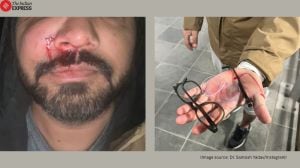30 years and counting: A look at oldest cases awaiting trial at Delhi courts
These cases are among 64 others, being investigated by the CBI, which have been pending for over 20 years in Delhi's Rouse Avenue Court. These cases have now been declared “urgent cases”.
 According to the official records, there are 1.17 lakh criminal cases pending in Central Delhi’s district courts – Tis Hazari and Rouse Avenue. (File Photo)
According to the official records, there are 1.17 lakh criminal cases pending in Central Delhi’s district courts – Tis Hazari and Rouse Avenue. (File Photo)Twenty years and three months ago, an FIR was registered against former IAS officer and then Delhi Development Authority (DDA) vice-chairman Subhash Sharma, accusing him of using his official position to prevent the demolition of an unauthorised construction to install a lift in the commercial complex at Mahavira Towers in Paschim Vihar. Even today, the trial hasn’t been completed in this case being investigated by the Central Bureau of Investigation (CBI). The trial has begun and witnesses are currently being examined. There are two other cases against Sharma, both pending for 20 years each.
These cases are among 64 others, being investigated by the CBI, which have been pending for over 20 years in Delhi’s Rouse Avenue Court. These cases have now been declared “urgent cases”.
After a Delhi High Court order, the officials have made the details of such cases public recently, displaying their details on notice boards outside various courtrooms in this court complex. The HC has asked to expedite the cases, pending for over 20 years, by December this year.
According to the official records, there are 1.17 lakh criminal cases pending in Central Delhi’s district courts – Tis Hazari and Rouse Avenue. Of these, 118 have been pending for 20 to 30 years while nine have been pending for three decades or more.
Filed mostly against former public servants, these cases range from corruption and disproportionate assets to bank frauds and even murder.
Here are the details of a few of the oldest pending cases and their status:
Thirty nine of these cases (58%) are still stuck at the stage of prosecution evidence (examining witnesses). For instance, in a 20-year-old bank fraud case, 32 witnesses are yet to be examined. One witness is abroad and directions have been passed to examine them via video-conferencing.
Eleven of these cases are at the stage of framing of charge.

Five cases have been pending for over 35 years. The oldest case has been pending for 37 years and 4 months. In “CBI vs SK Tyagi,” the agency had registered separate cases against Rajkumar Karanwal and Manish Kumar — two directors from Lancer Healthcare Pvt Ltd and former senior officials from Corporation Bank, alleging that they forged documents to secure loans, leading to Rs 27 crore loss to the bank. The CBI also raided the premises of these directors in 2017.
Two other cases had been pending for over 30 years. Both are still at the stage of examining witnesses.
Five cases are at the stage of final arguments. It is only in these cases that the trial is likely to be concluded by the end of this year.
In a case where trial is set to begin, three men were allegedly murdered in March 1994 at the behest of former Punjab Police Chief Sumedh Saini to settle a personal score against the owners of Saini Motors, an automobile dealership in Punjab. Two of the deceased — Vinod and Ashok — were financiers to Saini Motors. The complainant in this case, Ashish Kumar, is 61 years old and has attended 96 hearings in Rouse Avenue Court since 2019. Sumedh Singh Saini, now 66, is a 1982 batch Indian Police Service (IPS) officer, who retired as Director General of Police as well as chairman of Punjab Police Housing Corporation on June 30, 2018 after putting in 36 years of service.
In another case, pending for almost 28 years, the CBI alleged that accused Harbir Singh Harnotia, the then chairman of Parishad Cooperative Bank, along with other officials cheated the Bank in Karol Bagh in 1991-92 inflicting Rs 41.79 lakh loss to it.
In a case that was pending for over 28 years, 1974 batch IAS officer CS Khairwal was acquitted by Special Judge Prashant Kumar of Rouse Avenue Court on August 3. This case was registered against Khairwal in February 1996, alleging he had amassed huge assets, disproportionate to his known sources of income. From July 1974 to February 1996, the CBI alleged that he received Rs 12 lakh as salary but had acquired properties worth Rs.1.92 crore. The assets included four properties in Delhi. The court acquitted him stating that the CBI had not produced any evidence to establish that the assets belonged to him or his kin.
In another case where acquittal took place, the Court was far harsher on the CBI. After a 37-year-old probe that was termed “shoddy” by the Court, the brother of a 1969 Nagaland cadre IAS officer was acquitted in a disproportionate assets case. Earlier this year, the officer, S S Ahluwalia, now 86, had already been declared “unfit to stand trial” after he was found to be suffering from moderate dementia and atypical Parkinson’s disease. The court pulled up the CBI stating that it “never intended to take the case to its logical conclusion.” The case was lodged in 1987. With time, around 200 witnesses either passed away or could not appear before the court.












